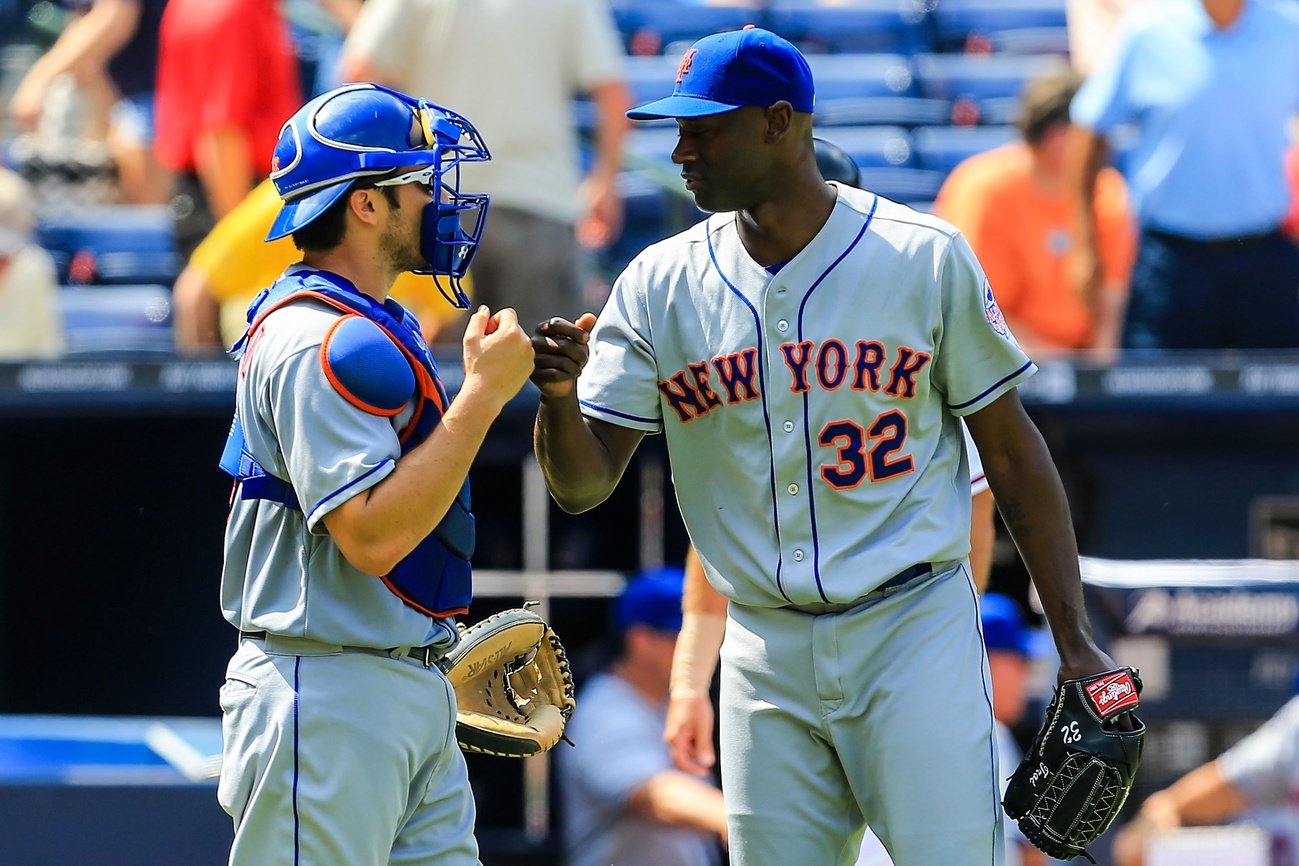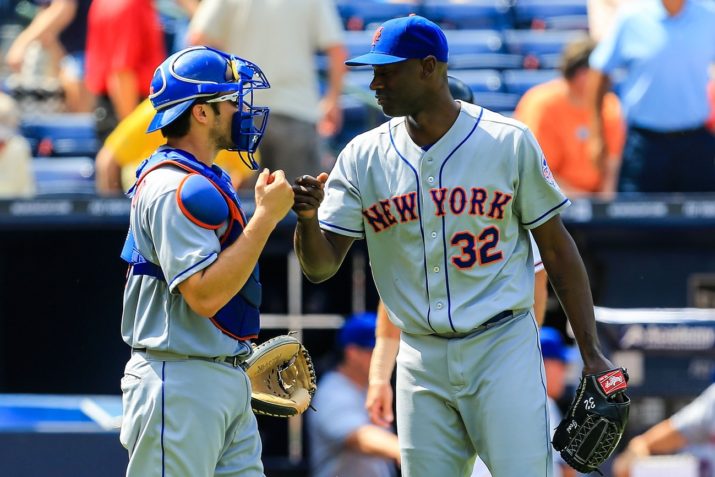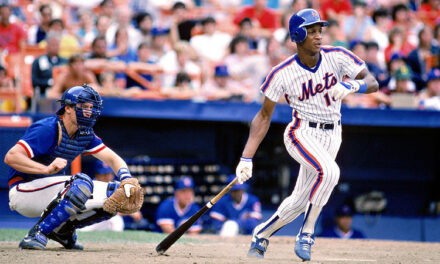
There are players in the game of baseball that are revered for their amazing stats and feats on the field, posting All-Star numbers year after year, while making an impact on his respected club.
Then there are those who make an impact both on and off the field, offering their tutelage and guidance to others freely, an act of understanding the role that is the veteran player.
LaTroy Hawkins exemplifies the latter.
Hawkins, 44, played for 11 different organizations over a solid 21-year major league career. A seventh-round pick by the Minnesota Twins in the 1991 Draft, Hawkins rose through the system as a starting pitcher. He remained in that role until the spring of 2000, when he was converted to the bullpen.
Over his entire career – spanning from 1995 to 2015 – Hawkins appeared in 1,042 games, 10th-most all-time among pitchers. That number also signifies Hawkins’ durability throughout his career.
From his first year as a reliever in 2000 to his final season in 2015 and among qualified relief pitchers, Hawkins ranks first in games (943) and innings pitched (946.0), while his 11.7 fWAR ranks 12th.
When speaking with Hawkins, you can tell that he relished the chance to be a mentor for so many young pitchers. An affable and humble individual, Hawkins admits that he appreciated when players would approach him with questions, and understood his role as a veteran presence in the pen.
The hard-throwing right-hander pitched for both New York clubs, the Yankees for the first half of the 2008 season, and the Mets in 2013. That year, Hawkins was first among Met relievers in innings pitched (70.2) and 2nd in game appearances (72), while pitching to a 2.93 ERA.
Not bad for a guy that didn’t receive a single major league offer that previous offseason.
Hawkins retired after the 2015 season with Toronto, and in the winter of 2016, accepted a position along with two other beloved Twins, Michael Cuddyer and Torii Hunter, as special assistants to the team. To date, Hawkins has dabbled in front office responsibilities along with working in the broadcast booth.
Weighing his options for the future, Hawkins is enjoying his time with the Twins and getting to experience different facets that come with the job. He looks at this opportunity as one to evaluate what he likes best, while not shooting down the possibility of potentially returning to the game as a coach or manager in the future.
I had the privilege of interviewing Hawkins where we discussed his transition from the starting rotation to the pen, his time with the Mets, the quick pitch and his thoughts on bullpen specialization.
MMO: You began your career as a starting pitcher with the Minnesota Twins, and later converted to the bullpen. What was that transition like for you, and who initially recommended that you would be better utilized out of the pen?
LaTroy: I don’t think it was a challenge physically. It was a mental challenge for me, because I always started in the minor leagues, and my first 98 appearances in the big leagues were starts. I think it was more of a mental challenge as opposed to a physical challenge.
In spring training of 2000, I would start a game and then the next time I started I would piggyback the starter. I would come in during the fifth or sixth inning or whenever he was done.
When I made the team out of spring training, I got to Minnesota and Tom Kelly called me in his office. He told me that they were going to transition me to the bullpen, that they had been doing it since spring training. He felt like that’s where I’d be more valuable to the team and the rest is history. You either stay up there and learn how to pitch in the big leagues or, you can go to Salt Lake City.
I told him I pick to stay up here and learn how to pitch out of the bullpen.
MMO: You finished your career 10th all-time among pitchers in game appearances with 1,042. What does that number mean to you?
LaTroy: When I got to like 850 appearances, I really felt like I had a chance to get to 1,000. When I looked at the short list of guys who pitched in Major League Baseball who made it to 1,000, that become one of my goals towards the end of my career. I was able to fulfill that goal in 2014 in my last appearance of the season. That was pretty cool.
You know, I never made an All-Star team or won a World Series, but I did leave a small impact on the game with being 10th all-time in games pitched.
MMO: Playing for eleven different organizations in your career, was it difficult for you to be on the move and relocate as often as you did?
LaTroy: The first two times it was because I was traded, I think May 28 in 2005, from Chicago to San Francisco. That was tough because I had a place in Chicago and figured I’d be there for three years, so that was tough on me and the family. Then I was in San Francisco from May 28 to the Winter Meetings in the offseason and I was traded.
After that, it wasn’t a problem at all, I actually enjoyed it.
I didn’t look at it as a negative, I looked at it as a chance to meet new people: front office people, teammates, coaches, grounds crew, security guards and vendors. You get a chance to meet all new people as opposed to just knowing the people in my hometown where I played in Minnesota and the other teams that we played against.
It was great for me to spend time and meet people because how many can say they’ve lived in 11 different cities? Not many, so I look at it that way.
Every city was different in its own right; you find a lot of good restaurants and it was just a great time. I never looked at it as, Oh, why me? Why can’t I stay in one place? Once you get in there you understand being a bullpen guy, that’s part of it. The sooner you embrace it, the better off you’ll be able to adjust.
MMO: Who were some of your favorite players growing up?
LaTroy: Growing up I was a huge Lee Smith, Leon Durham, Shawon Dunston, Ron Cey and Jody Davis fan. That Cubs team had some of the guys that I really looked up to playing professional baseball.
MMO: You spent the 2013 season in New York playing for the Mets. How did you like your time with the team?
LaTroy: I had a great time! Coming out of the 2012 season, I was with the Angels, and I started off the season pretty good. Then I broke my finger on a line drive and I didn’t want to have surgery. I figured I’d just let it heal and come back and it was [just] my pinky. I rushed back and I never felt the same, but I didn’t have a terrible year.
That offseason I couldn’t get a job, I mean not a job! I had one phone call and that was from Sandy Alderson. Sandy offered me a minor league deal and my agent, Larry Reynolds, first brought it to me and I was like, no! I didn’t have a bad enough year to get offered a minor league deal, that just doesn’t make sense to me.
I was like, I’ll walk away before I sign a minor league deal. That doesn’t make sense. He said, “Well, he [Alderson] also iterated that you have a very, very good chance to make this team if you don’t get hurt in spring training.” I was like, Well, I’d like to hear him say that.
I told my agent, ‘Let me think about it and let me get on the phone and talk to Sandy.’
I spoke with Sandy and he told me what he had told my agent. I thought about it and I was like, okay. I accepted the minor league deal with the New York Mets and headed off to Port St. Lucie.
It was just a great time. I enjoyed my time there in Queens as opposed to the Bronx. It was kind of what I was used to playing in Minnesota; everybody’s so close-knit on that side of town as far as fans and players, it was just a good time. I had some guys I had played with already before on that team so it made the adjustment just a little bit easier.
MMO: That’s a perfect segue, I was going to ask you about the differences you experienced between playing with the Yankees (’08) and the Mets.
LaTroy: One of the major differences for me was the cohesiveness of the team. When I was with the Mets, we all had a great time. There were some good dudes on the team. Ike Davis went through a tough time his last couple of years, there but he was the ultimate teammate.
David Wright and John Buck; Buck and I were locker mates and we had pretty much never met and then we were like brothers. Tim Byrdak, I played with Tim in Houston.
Then we had a lot of young guys who enjoyed having me around. Matt Harvey’s rookie year he was, man, he was lights out. We just had a real close team, we were just very, very close. We did a lot of things together. We only won 74 games but, going into it, I don’t think we were expected to win more than that.
MMO: Do fans underrate the cohesive element of teams?
LaTroy: I think when teams are younger, they need to be closer. Once you get older, you all have your own different interests. But you understand that the outside interests are your outside interests and once you’re in the ballpark you’re there to do your job.
I think when they’re younger, yes, but, once everybody gets established and understands what it takes to be a professional baseball player, I think that’s where the difference comes in.
MMO: You played a mentor role for many of the young Mets in that pen. Did you embrace that position?
LaTroy: Yeah, I did. Just being in the bullpen we had guys like Scott Rice. I remember, and I get chills thinking about it, Scott had watered around in the minor leagues and he was a first-round pick, and he made the team that year. His first time in the big leagues, just to see the appreciation and all the hard work that he put in and perseverance, that was one of the coolest moments that year for me.
Having him in the bullpen and Carlos Torres, and you had Jeurys Familia. Hansel Robles wasn’t there, but I had spent some time with him in spring training. Those guys were young and they were hungry for information. They respected the fact that I had been there and done it, and they leaned on me with a lot of questions every day.
We had Daisuke Matsuzaka in the bullpen for a little bit with us. Aaron Laffey came up and pitched two or three games, and Jeremy Hefner, who ended up getting hurt. Aaron Harang came over for a little bit as well, and Pedro Feliciano came back that year.
We had a very young bullpen, and it was just good to be the old guy in the bullpen and everybody had total respect. Guys wanted to ask questions and learn how I did it for so long through the ups and downs.
MMO: Who did you learn the quick pitch from?
LaTroy: My pitching coach in Milwaukee, Rick Peterson. We had talked about it and I was hurt that year. We had talked about it and the reason why you would do it is the same reason why you pitch and change speeds: to disrupt hitters’ timing. That’s the reason why I decided to do it because it made sense, it made total sense. Disrupting a hitters timing, that’s our sole purpose when you’re pitching and I went out there and started to do it, and started to do it on a more regular basis.
The young guys saw it, they liked it, they saw the results that I was getting and they were athletic enough to implement it and it was a part of their repertoire. Some of the guys, Robles and Familia, were able to do it.
MMO: This past winter you accepted a role with the Minnesota Twins as a special assistant. Have you thought about what you’d like to do moving forward, and have you given any thought to getting back in the game as a coach or potential manager someday?
LaTroy: You know, we’ll see. When I took this job, Thad Levine, Derek Falvey and our head guys over there would talk about what I wanted to do in two years, three years, and five years. I didn’t hold anything back, I told them I don’t know. I’ve done the same thing for the last 25 years playing baseball, let me do a little bit of everything in the next two years and hopefully, by the end of those 24 months, I’ll have a better idea of whether I want to move into the broadcasting booth, whether I want to go back onto the field, or go into player development. I just don’t know right now.
A lot of that has to do with [the fact that] I have a 16-year-old daughter, who’s a junior in high school. In two years she’ll be graduating from high school, so I can move around just a little bit more. Nothing worse than being gone for 21 years and then all of the sudden you’re going to be gone again as a coach. Being on the road, it’s tough.
MMO: What’s your take on the specialization of bullpens that we’ve seen in the game the past several seasons?
LaTroy: My take is you play the game to win the game, whichever way that plays out. When I played, we talked about it. You could lose the game in the seventh inning, you could lose the game in the sixth inning. I look at it [as], why not put one of your best pitchers in at that time to save the game and let it play out from there on?
A lot of time, you can lose the game in the fifth, sixth, seventh inning, so why would you be saving your best pitcher for last if you need him right then? That’s just part of it. That’s the thing about sports and especially baseball, it evolves over time. It’s just another version of baseball evolving to its full potential.
MMO: I read a story once that you had given up a home run to Ken Griffey, Jr. when you were with the Twins. And after he hit it, he wanted to talk with you about your pitch selection. Is that true?
LaTroy: Yeah, I started a game against him and, I don’t know what inning I came out of, but in Minnesota in the old Metrodome, the clubhouses were connected. The only thing that separated them was the laundry room. They used a common laundry room and on both sides are the entrances to both clubhouses.
I gave up a home run. I get ahead of Griffey 1-2 or 2-2 and I threw him a changeup and he hit it out.
After the inning, I was taken out of the game. I was sitting in the clubhouse, and in the visiting clubhouse, an attendant said, “Hey, Griffey wants to talk to you. He’s in the laundry room.” I was like, What the heck does he want?
We got to talking and the first thing he said to me was, “Why did you throw me a changeup?” And I’m thinking to myself, What do you mean why did I throw you a changeup? I was trying to get you out! And he said, “No, your fastball is good enough not to have to trick guys with that pitch.” I mulled on it for a little bit and thought like wow, my fastball’s good enough.
Once he told me that, in my mind, I stopped trying to trick guys and just went out there and said, ‘I’m always going to go out there and throw my best pitch.’
I think I ended up throwing my fastball like 76 percent of the time the rest of my career. It was a great meeting with Griffey right there.
MMO: In a way, Griffey helped you gain confidence in your fastball?
LaTroy: Yes he did. He gave me confidence in what I had.
MMO: Looking back on your career, what moments do you look back on fondly?
LaTroy: Man, people ask me this. It’s like, I played so long the early memories have faded and gave away to all the most recent memories. [Laughs.] Now I always pick my 1,000th appearance. It actually happened in Dodger Stadium and the great Vin Scully called it. When I listen to it I just, I mean, I just love listening to Vin. He brings the game to life.
Another was, I did a lot of things in baseball, [but] I like to say I was blessed enough to play with Mike Trout his rookie year. I knew he was incredible his rookie year, but just to know I played with him that year and then watching him continue to get better every year and he’s going to be a Hall of Famer if he continues at the rate he’s at right now. Just to know that I saw it from the beginning.
MMO: You knew right away that he was going to be something special?
LaTroy: Oh yeah. And he didn’t play a game with us in spring training, he came up in the middle of April and it was something to see.
MMO: Didn’t you also face Michael Jordan in the minor leagues?
LaTroy: Yeah, I faced Jordan in the minor leagues. It was awesome because I grew up in Gary, Indiana, probably about thirty miles from Chicago. I grew up a huge Michael Jordan fan and got the chance to face him when I played in Double-A in 1994 and he was in Birmingham.
It was just a surreal experience. One of the coolest experiences baseball has given me. Being able to play against my childhood idol in Michael Jordan.
MMO: How did you fare against him?
LaTroy: They did a special on Fox Sports North in Minnesota, and they went back and got some old footage, so there’s footage out there. I think he went like 1-for-7 or 1-for-8.
No one said he wasn’t that good. For him to not have played baseball since high school and then come and be thrown in Double-A, hitting over .200, I mean, that’s the equivalent of hitting like .280 or .290 to me. He got better as the year went on, so he was getting better.
It was a cool thing to see and to be a part of watching the year that Michael Jordan played baseball and I had the chance to play against him on many occasions.
MMO: Who were some of the toughest hitters you faced, and at the same time, players you had the most success against?
LaTroy: Toughest hitter? I can’t name names, but I say the toughest hitters are the guys that always swung at everything like they knew it was coming whether they hit it or not.
I remember Mike Napoli and Adrian Beltre, they swing at all the pitches the same. The guy I probably did the best against might be Matt Holliday I think.
MMO: I looked up your numbers on Baseball-Reference, you also had great success against Derek Jeter (8-for-32) and Alex Rodriguez (8-for-34).
LaTroy: Really? But I probably faced those guys a lot!
MMO: You did, but, you held your own against those two: low OPS and on-base percentage numbers.
LaTroy: Yeah, that’s because their teammates did all the damage against me! [Laughs.]
MMO: You announced ahead of time that 2015 was going to be your final season in the majors. What was that season like for you, and how does one stay so composed knowing that it’s the final go around?
LaTroy: When I got to spring training that year, I sat down and talked with my pitching coach Steve Foster and our manager Walt Weiss (Rockies). They both played in the major leagues and both went through that final season. They gave me some very, very good insight and advice. They just talked about my last time around doing a lot of those things, you know it’s going to be different.
When you walk in the ballpark, all those smells that you have become accustomed to smelling that you didn’t smell anymore with the popcorn, the hot dogs; you’re going to smell all of that again. And you know what? That came to be so true. When you walk into a ballpark you sit there and just think about all the good and bad times you had there.
Knowing it was my last year, I wanted to win and I went out there and did my job. I was already a calm person but I had an eerie type of calm that I went through that season with knowing it was my last time. I just took it all in stride, I tried to savor every moment. I tried to cultivate all the relationships that I made over the years and tried to make the best of it and make the most of it. I think I did that, it was fun.
I got traded in the Troy Tulowitzki trade from Denver to Toronto, that was a cool experience because I had the chance to be on a winning team my last year in professional baseball. That’s kind of the icing on top, being able to feel that type of adrenaline again going out. It was fun!
I enjoyed the whole process and not once did I think, you know what, I might come back next year. That never crossed my mind, still doesn’t cross my mind to this day. I was at peace with it because I had a chance to do something that not many players in any sport get a chance to do, and that’s walk away on your own terms. When you know you still have enough to get major league hitters out – I was still throwing 96 miles per hour – but, I had a unique opportunity and I took advantage of it.
I walked away before someone told me I wasn’t good enough to play the game anymore.
MMO: We could use your right arm in Queens if you change your mind, LaTroy!
LaTroy: Nah, I’ll pass. They’ll figure it out over there, they will. Another thing that was awesome with my time with the Mets was Terry Collins. Terry was awesome.
I know everybody in New York every time they don’t do well call for his head. I don’t think he gets enough credit for what he does when all the stars get hurt, the starting rotation goes down. The decisions that he made over the last couple of years to keep them competitive, it goes unnoticed. He was just a breath of fresh air for me.
When you’re a veteran on a team you get a chance to have different types of conversations with your manager. I had a lot of good conversations with Terry about my role and what he expected out of me and what he needed me to do. He challenged me and I appreciated that.
Just watching him from afar, that’s Terry being Terry. Always finding a way to get things done when the situation looks so bleak.
MMO: Thank you so much for your time today, LaTroy. It was great speaking with you.
LaTroy: Thank you for considering me. Take care!
Follow LaTroy Hawkins on Twitter, @LaTroyHawkins32
















